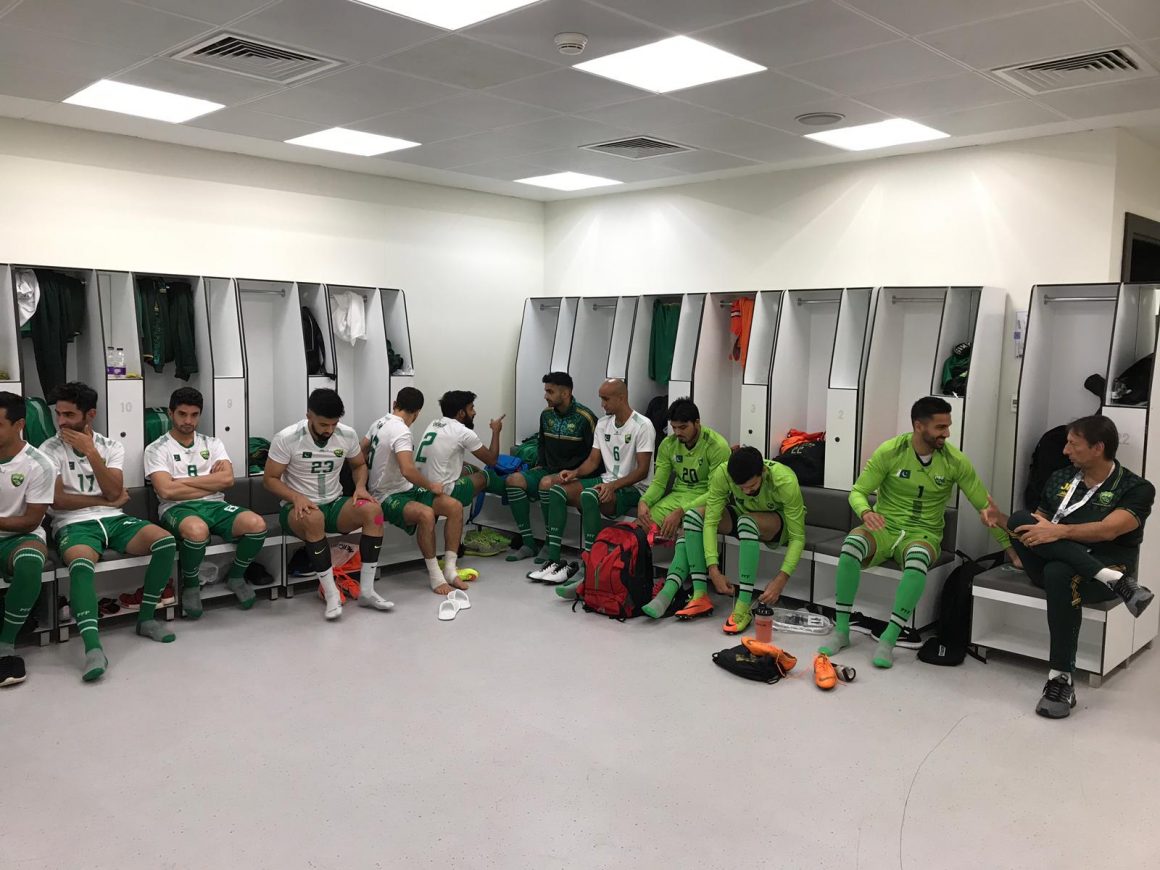Originally written by Romain Molina in French and published on 4 August 2019 in the Swiss newspaper Le Temps covering the Pakistan-Cambodia two-legged preliminary qualifier for the 2022 FIFA World Cup back in June 2019.
Translated into English by Bastien Azzarello. Edited by Ali Ahsan.
3 and a half years before the 2022 FIFA World Cup officially begins in Qatar. Far from the mad media coverage and glamour, the twelve weakest nations of the Asian Football Confederation played a two-legged preliminary playoff. Only six fortunate ones reached the main AFC qualifying groups chasing the proverbial World Cup dream, while the other six would see theirs’ finish there and then. For two of them, Pakistan and Cambodia, this preliminary was even more symbolical due to the place where their return fixture was played: Hamad Bin Khalifa Stadium in Doha, Qatar. A final before the real one in 2022.
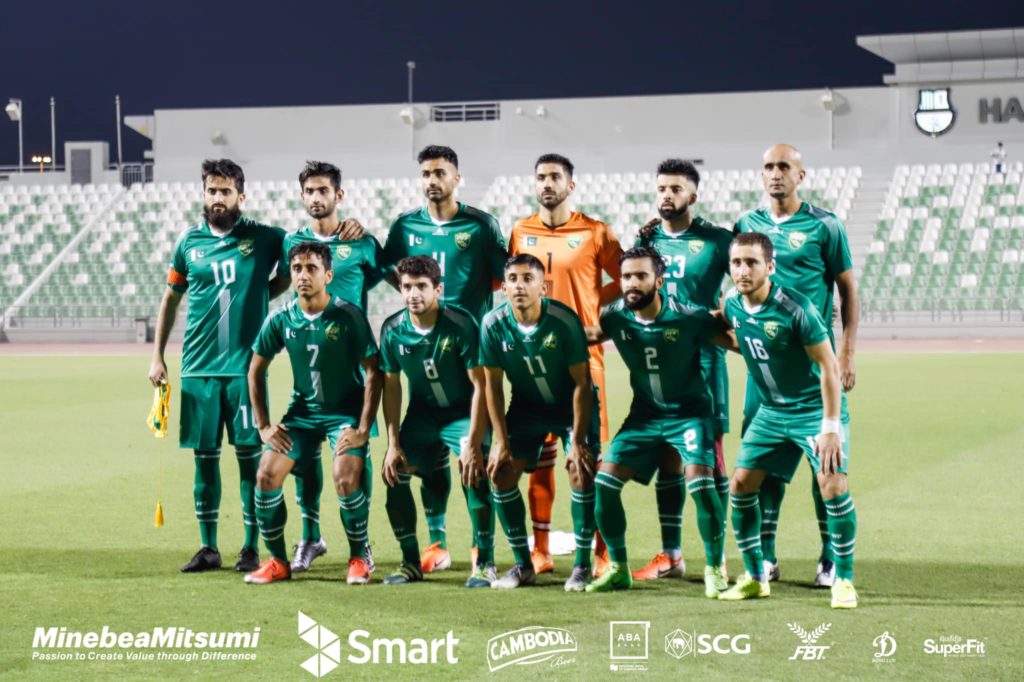
“As far as the match is concerned, it’s genuinely simple. If we lose, there will be three or four long years without football, sacrificing another generation of our young players. But if do make it…” Shehzad Anwar raises his eyes to heaven “We’ll go down in history, we’ll go down in history… And we will do it, Inshallah!”
At the end of dinner and a double serving of dessert, the technical director of Pakistan’s national team remains determined: In two days, the ‘home’ leg for Pakistan against Cambodia will be played, chasing a 2-0 deficit after being thrashed away in front of a charged-up Phnom Penh crowd under torrential rain. “We are capable of a comeback; I have no doubt!” Anwar exclaimed with a greedy smile.
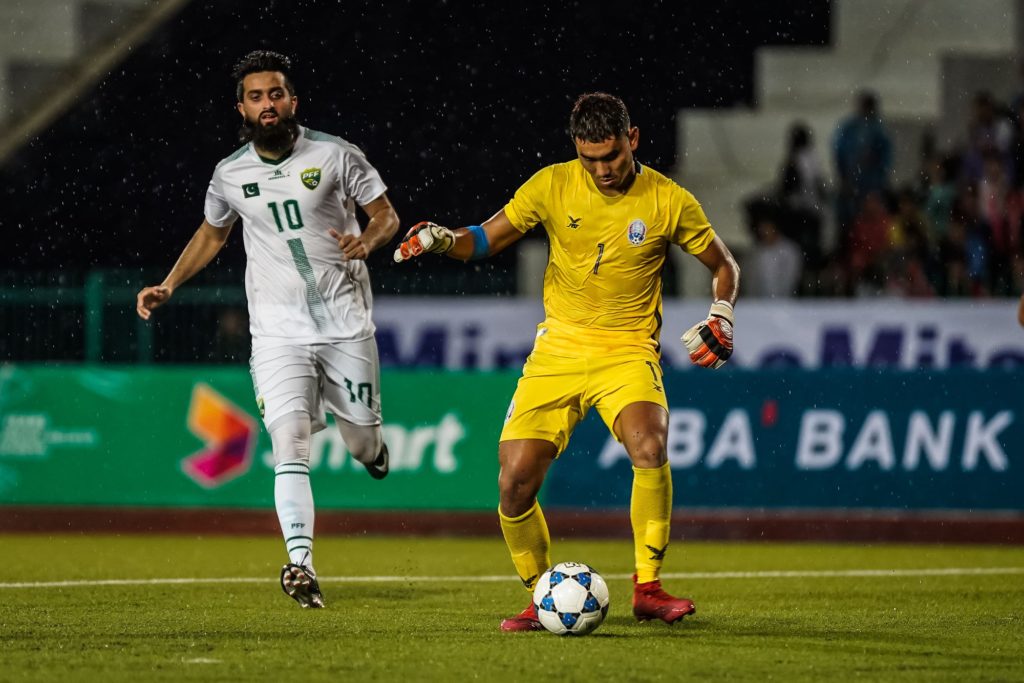
Pakistan is the fifth most populated country in the world with more than 216 million inhabitants. Yet, it is among the worst ranked national football teams by FIFA – 200 out of 211 FIFA members, behind Samoa, Djibouti, Montserrat or the Seychelles. “To improve these rankings, we must play international matches regularly. But who wants to play with us? Nobody wants to play against such poorly ranked team like our’s. Moreover, since we were banned from any football activity by FIFA in 2017(1)…”
The comment is obvious but still important: throughout its entire history, Pakistan has never ranked above 142nd in world football and never won a single World Cup qualifying game either!
“Football exists in Pakistan, but problem is nobody knows; it’s all about cricket.”
“In this group of players, some of them have barely won a single match with the national team,” says José Antonio Nogueira. “That’s why we must remain positive. Some players are traumatized by our past failures, others simply lack self-confidence. We need to overcome this mindset, but that’s a long process.” In the thirty World Cup qualifying matches for Pakistan, the results are indeed depressing: 26 loss, 4 draws (against Sri Lanka in 2001, Iraq in 2007, Bangladesh in 2011 and Yemen in 2015), 12 goals scored, 117 conceded…
To make matters worse, the Pakistan Football Federation (PFF) for years has been torn apart by internal feuds and power struggles among stakeholders, symbolized by its president Faisal Saleh Hayat. It would take a book to talk about this man, coup attempts, corruption cases, political interference or journalists being blacklisted for not praising the glorious vision of the good president.
One example says it all: to prepare for the two-legged preliminary against Cambodia, the two rival self-proclaimed entities “responsible for Pakistani Football” created two different teams with two different sets of coaches and players! A complete farce arbitrated by FIFA which had threatened for weeks to expel Pakistan from competition and prohibited them from playing at home. Hence the relocation of Pakistan’s ‘home’ game to Qatar.
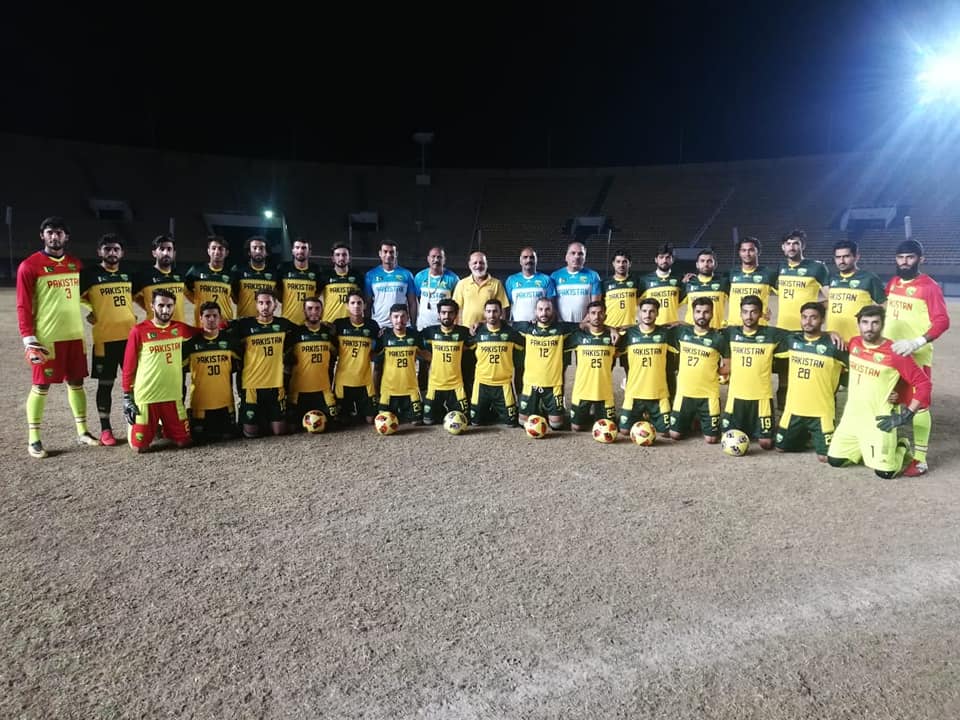
Eventually, Hayat’s PFF faction was considered the ‘legitimate’ one by FIFA as it trained obroard in Bahrain at the local federation’s expense which also pays for Pakistan’s Brazilian coach Nogueira. To make it more obvious, Hayat’s ‘legitimate’ PFF voted for the incumbent AFC president, Sheikh Salman bin Ibrahim Al Khalifa of Bahrain’s ruling family.
Cambodia’s ‘French Connection’
At the ‘Concorde,’ one of the most popular five-star hotels in Doha, the atmosphere is very different. In the hotel lobby, Cambodia’s staff cheerfully prepare their team’s equipment for a training session. “There is nothing more we can want,” Thierry Bin, one of the stars of the team, says. “I cherish these moments, but I don’t get worked up. I know what I had to endured to get here.”
Raised in Aulnay-sous-Bois, in the Île-de-France region, Bin joined RC Strasbourg’s academy as a teen, then the French national U16 team where he faced Germany and Turkey with the best players of that generation such as Alexandre Lacazette. “But I screwed up… I wasn’t the most serious lad” (he laughs). Eventually he had to say goodbye to Strasbourg, to the French jersey and to the very beginning of his career. Thierry came back home and start all over again; not even 20 yet. “It was brutal, but I didn’t want to give up and I could rely on my family’s support.”
Bin’s new life is typical of lower division footballers. Hundreds of players roaming around from an amateur club to a semi-professional team, dealing with their own injuries – for him, it was a metatarsal fracture – chasing whatever bonuses and short-term contracts came along, hoping that someday, in a moment of pure luck, an agent, a coach or fate just knocks at the door on morning. “A former Cambodian international had the project to create a team of Franco-Khmers players and to tour there or in Thailand. He brought together Franco-Khmers from France and we went. It was an amazing trip, a good ride with friends, which got me a few good offers.”
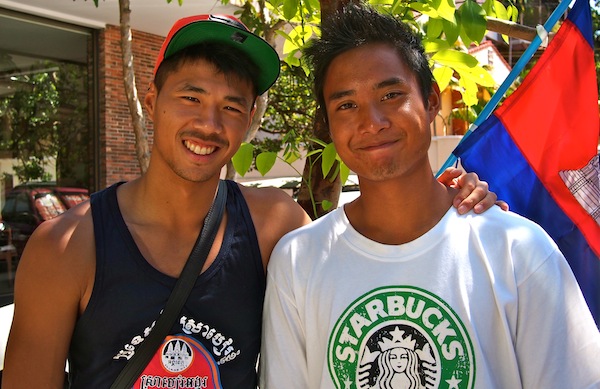
In this case, an offer from Phom Penh Crown FC. The ‘Red Lions’ of the Cambodian capital already had another Franco-Khmer player in defender Boris Kok, who had trained at AS Nancy. “We lived together, sometimes with a bunch of other players. But there weren’t enough beds or sofas, so we sometimes slept on the floor (laughs). It makes me laughs now but we had to stand firm. Housing was provided but we were just paid a few hundred dollars a month, so we were living rough. But we worked like hell to make our dreams come true.”
Dreams that were not initially understood by the two players’ families. “They didn’t want me to go there,” says Boris Kok. “They kept telling me: ‘We did not leave Cambodia just so that you go back there.’ My parents’ ideas (and others in the same case) was to remain in France and get a suitable education in order to have bright future.”
For the two players’ mothers, going back was simply unthinkable. “She didn’t want me to live in Cambodia, she was afraid about my safety,” Thierry explains. “I took a while, but eventually she understood it was no longer the same country she had known.” For Boris’ mom, it allowed her to return decades later like so many other victims of a country devastated by civil war and the Khmer Rouge regime where around 20% of the population perished in horrendous conditions. “She came to see me and realized we could live well in Cambodia (…) Finally, she was the proudest mom ever after seeing me wear the national team jersey.”
Taking vacations to join the national team
While Boris Kok does not wear the national jersey anymore, Thierry Bin remains regular for his country just like Va Sokthorn (injured) and Dani Kouch, an offensive midfielder with superb skills as seen in his ‘freestyle’ demonstrations across the streets of the capital. “He is an artist, good luck taking the ball away from him if you can,” Thierry laughs.
His profile caught the attention of the new team manager, Keisuke Honda. Honda, the former Japanese player who once played at CSKA Moscow and Milan, you ask? Yes, the same one who also played for Melbourne Victory in Australia! Player-coach is therefore something possible, yes, but it requires the help of Félix Dalmas. The Argentinian was initially appointed Cambodia head coach but works more as the assistant manager and translator. “We work together,” he briefly commented, and admits spending most of his time in Cambodia.
“Well, that’s enough, we need to focus now,” he urged while leaving the short press conference the day before the match. This reserved and distant attitude from Cambodian officials left the local journalists and members of the FIFA crowd somewhat speechless as a total contrast to the accessibility and bonhomie from the Pakistani officials. “Nobody cares about us, so no point acting like stars…” Hassan Bashir bursts out laughing.
The all-time best scorer of Pakistan (8 goals in 20 matches) takes time to answer everyone: the media, organizers, hotel personnel and especially his young teammates with whom he juggles between languages. “I speak Danish, English, Punjabi, Urdu(2) and some German, so it’s okay,” Bashir says talking about his career and childhood in Copenhagen. “I was raised here. My father was 25 when he came to Denmark. He was looking for a better life since Pakistan was at war at the time. He was not exactly a war refugee. However, considering the Cold War context and tensions with India and Afghanistan, it was all the same. With my mom, they both come from remote and isolated villages three hours away from Islamabad and Lahore, two of the biggest cities of the country, so it was a huge change coming to Copenhagen.”

They hoped it would be a change for the better, at least for their kids. “I had a happy childhood. We didn’t have much, but we loved each other. That’s what my wife and I are also trying to teach our children now.” Studies, football and faith are Hassan Bashir’s daily routine, and something repeated through his entire life. “I was a professional footballer until I was 24-25; I even played a season in Thailand but got badly injured… Denmark’s second and third divisions are only semi-professional, so I had to work while training three of four times a week.”
Banker by day, goal scorer by evening, Bashir had his first Pakistan team call-up in 2012 for a friendly against Singapore which was a 4-0 loss. “My boss has always been supportive towards my activity with the national team, because I had to take leave for each match. Our team doesn’t really have any professional players, therefore it’s always complicated.”
Profession: Headmaster, Hobby: Striker
Deeming the quality of domestic players as insufficient for international football, Pakistan Football Federation effectively opened to the world, searching for more developed talent in the 8 million strong Pakistani diasporas. “When I got my post, there was absolutely nothing. Not a single piece of computerized information, no data, nothing,” Shehzad Anwar, the Technical Director of the Pakistani Federation, complains. “I traveled to Europe. I met the players and their families to convince them to come and represent Pakistan. Initially, it was genuinely difficult as there was no team, nothing at all. We had to prove the credibility of our project and some lads such as Hassan Bashir really helped. He’s a role model.”
Listening to these words, Hassan prefers to laugh. “I try to be the best human being possible, that’s all. I’m a wonderer. I always wonder what I can do to improve my community. That’s why I quit my rather well-paying job to open a school. Denmark’s political situation has really evolved lately, just like in other European countries – isn’t there one in France named Marine Le Pen? (laughs) Some politicians want to stigmatize the Muslim community by blaming them for many things. It makes me sad, but I am also realistic. There are certainly some things wrong in my community and I cannot be blind to things not going the right way. We live in Denmark and there are some who don’t even speak Danish, this is not normal. (…) Another example: there are some schools exclusively dedicated to the Muslim community, but it only furthers distance between communities rather than bridge them. What interest can be seen in this? My idea is to open a school which would do the opposite: to make Islam fit in Denmark. We use the national syllabus with some exceptions: we also teach English from the age of 6, and there are some classes about Islam as well. The school is open to everyone but most of the students mainly come from underprivileged families in Copenhagen, especially the Muslim community.”
For the next school year, more than 100 students are expected, and the Danish government has officially approved to raise funds for the school. “My wife is a teacher, but she doesn’t work here; we try not to put all our eggs in the same basket. It is a wonderful achievement. I want to be able to leave this world thinking I accomplished something for my community. I’m happy with the current progress, yes, but the road is still long, and it is the same for the national team.” With one difference: Hassan no longer needs to ask time off from his boss, “I am the headmaster, I am my own boss (laughs)!”
Attacks and delocalization
Match Day. “The coach told us to be very careful in the first minutes because they will put pressure on us, but we are confident. They did not scare us at home, they stayed back,” said Thierry Blin. But this version is not shared by the Pakistani coach. “They scored twice in the last ten minutes, but they never overwhelmed us,” Nogueira argues. “Moreover, we had a marvelous chance when it was still nil-nil…”
He refers to a great header from Bashir setting up one of the Nabi brothers(3), Samir, unmarked in the box only for him to shoot straight to the Cambodian goalkeeper. “Such a chance… he knows he should have scored, it made him lose sleep,” Shehzad adds during a session at the green and white enclosure of Doha’s Al-Ahli SC at the Hamad bin Khalifa Stadium. “These are our colors, so it’s like home. We hope the Pakistani community will come to see us today.”
The hope was for more people to show up than the previous World Cup qualifying campaign for Pakistan that was also played away from home against Yemen, a country destroyed by an endless war forcing their team to essentially play in exile. “We played in Qatar, but it wasn’t easy,” Bashir reminds.
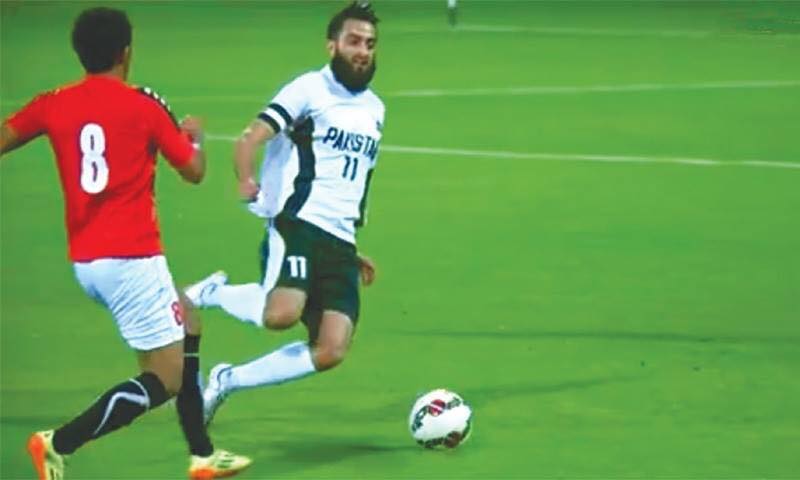
Always capable of doing the worst, Pakistan conceded a penalty after… twelve seconds, like a curse. They eventually lost 3-1 to Yemen in the first leg even though the headmaster scored. “We were training for the home game in Lahore, but the day before the match, there was an attack, two bombs exploded… People died (15), many more wounded (more than 70), it was chaos. FIFA decided to relocate that match on security grounds as well.”
23 March 2015, in Bahrain, became a turning point in Pakistani football history. “We had to wait three more years to play another game. More than three years without a national team…” Bashir keeps quiet for a moment. “This game against Yemen is very special for my life. It was special because I didn’t know if I was wearing the national jersey for the last time and because it was my first World Cup qualifying campaign. I fulfilled any kid’s dream: wearing the national team jersey in a World Cup match, and I did it as a captain. I don’t care if it’s a first qualifying round. For me, this is a World Cup. I cannot explain how I felt that day but if we were playing at home, obviously, that feeling would have been even stronger.”
A 0-0 draw later, Pakistan left the 2018 FIFA World Cup qualifiers, not knowing if there was a future. “We waited so many years, but here we are. Today’s match against Cambodia will be my 21st match with Pakistan but I’ve only played once at home and I know it may never happen again. I’m 32… if we are eliminated, the next World Cup will certainly be too far away from me.”
The UFT: The Unidentified Flying Pakistani 40-meters Throw-In
Soon it became 7pm. The Hamad bin Khalifa Stadium became shrouded under a hot night while the Call to Prayer resonated in the stands. The faithful congregate in the mosque adjoining the sport complex not knowing that a few meters away, two teams are about to play the first finale of the 2022 World Cup. A young man behind the Pakistani bench shouts: “Come on boys, come on.”
Several staff members approach him, hugging him, and go back into to the locker room. Restless, he quickly begins to speak to me, in near-perfect English: “I play in Qatar, but I have been training with them these past days (..) As a young boy, I used to play for Qatar but it didn’t make me feel anything particular. I was born here but my parents are Pakistanis. It may seem dumb, but when I trained with Pakistan, and put on the national team jersey… My heart was pounding in my chest. I’m not trying to exaggerate here, but I knew it was my country’s jersey.”
Saad Ahmed, who is completing his engineering studies, also plays as a right back but today he came to support his future potential team-mates. “If we manage to qualify, I might be called-up for Pakistan… If we don’t… There won’t be any national team for years, and that would settle it.”
To avoid this, Pakistan need to tame the sweltering heat in an evening filled with hope and anxiety. “Calm down!” Nogueira keeps repeating to calm his team after another misplaced pass, his polo shirt already drenched with sweat with Technical Director Shehzad helping him yell the instructions in Urdu as well.

On the other end, Keisuke Honda shows impeccable serenity, nonchalantly walking in front of his bench. He regularly applauses but doesn’t say a word. “He looks like he is getting ready to go clubbing,” jokes a member of the local organizing committee. Yet, he is not leaving the field to spend a fun night in West Bay, he has reasons to be worried: the Pakistani strategy is working.
“They’re small and thin, and I got taller more well-built men so we need to make it count.” Nogueira said the day before. “We need to constantly press to prevent them to do passes comfortably. Pay attention to their wingers because they know how to combine. With the ball, we must spread the game, and take our chances either through one-on-one situations, by crossing, or to put balls into the box. We have to win all of our aerial duels.” That was the idea. However, Pakistan’s actual playing style looks like a giant leapfrog game. Center backs keep on booting it towards Bashir or Adnan Mohammed, a winger playing in Danish second tier.
The objective is simple: trying to get anywhere close to the Cambodian box with a dribble, a free kick, a corner or, better still, a throw-in. “Everybody on the other side!” Nogueira yells after Pakistan get a throw-in 30 meters away from Cambodian goal. In comes Yaqoob Butt, the center back almost 2 meters tall, mainly there to protect his younger brother, Yousuf, the goalkeeper at the other end. “They’ve got character,” Saad Ahmed points out translating the baiting from the brothers to their opponents. “It’s hard to translate, but this is Urdu slang for ‘I’m going to show you my **** on your mum’s ***!’ We Pakistanis are truly creative for combining all kinds of insults together (laughs)!”
Taking a long run, Yaqoob launches the ball like missile in the box. Complete pandemonium, but it gets cleared. Two minutes later, another throw-in close to the corner spot. Another UFT: Unidentified Flying Throw-In. Trying to clear, Cambodian center back Ouk Sovann handles the ball with his arm: Penalty!
Hassan Bashir grabs the ball immediately. Centre-half Zesh Rehman, the first British player with South Asian roots to play in the Premier League, is usually the captain. But ‘Bash’ is the captain tonight just as he was four years ago against Yemen when he also scored a penalty. “He will score, for sure,” whispers Ahmed from the stands. “He did not miss a single one yesterday in training. Come on Hassan, Come on…”
Hassan deeply breathes and takes aim from the spot. Some subs prefer to look away and trust the noise of the few Pakistani supporters who came tonight.
“With the national team, I always have to assume responsibilities. Against Yemen, it was my role to shoot, I trained for this. It will be the same against Cambodia.” Hassan goes for it… Back of the net: Pakistan 1-0 Cambodia. “Come on boys, come on! Come on! Let’s do it! Just one more fucking goal!” Ahmed shouts. Bashir is on his knees, praying among his team-mates. However, he does not have illusions. Only God knows if he will see another World Cup.

The Big Boys Team
Ten minutes later, Bashir, again, gets past an opponent with a Shaquille O’Neal move, flowing beard but lacking the finishing touch. Even Honda watches on the sidelines with a worried look. Nevertheless, he doesn’t get angry or change his strategy against Pakistan’s free-kicks and now-famous Yaqoob Butt’s 40-meter throw-ins.
“Long balls, duels, we have to play old school,” Ahmed comments. A Pakistani teacher who lives in Doha adds “We don’t have to complicate things we don’t know how to be complicated. Look at them, we are no Spain. We are the Big Boys Team!”
Not necessarily gifted with the ball but surely a team well-fed since they were children. “The food in Pakistan is delicious,” the teacher adds. “Every time I go home, I have to watch my weight. Plus, our cuisine has regional varieties… People may have a bad image of our country, but we are very welcoming and there are many things to discover there…”
Contrary to Cambodia which became a travel destination of choice despite a bloody dictatorial past(5), Pakistan has not gotten rid of its open wounds and scars. Bombings, perpetual conflict with India, endless wars in neighboring Afghanistan, recent incursions by Daesh, the news from Pakistan is as dramatic as its depressing.
“Ask Nogueira how he feels at home in Pakistan, how he lives in Islamabad,” Shehzad Anwar grumbles. “We’ve got economic and political troubles, for sure, but there’s so much more in Pakistan, particularly sports (…) We want more from the government concerning this matter especially since the new Prime Minister (Imran Khan) was a great cricketer so he knows how sport can matter for our youth. For us, qualifying is also doing a step forward for a youth toiling to find work and needs to believe in something.”
The Technical Director continues about the growing popularity of football across the country, amateur tournaments attract thousands of spectators in Balochistan, the province bordering Iran, or in Karachi where “we play like in Brazil, producing very skillful but physically frail players. (…) Last year, during the Champions League final, there was a power outage. I go out, I see my neighbor: same problem. We started to call everyone: ‘Where can we find a working TV?’ (…) Eventually, we ended up in another town where we found a giant screen and hundreds of people sitting there to watch the game. We all enjoyed the match, it was wonderful. People are passionate about European football, especially the Premier League. Just so you know, I was with some players of the Pakistani national team and nobody recognized them; only some did at the end. In other countries, it would have created a crowd (laughs).”

Cambodian Prayers
Back in Doha, half-time comes at the right time for a Cambodia side struggling to withstand Pakistani pressure and became more determined since they scored. “They were so anxious… They needed to score to free themselves,” Ahmed thinks.
Some of the best Pakistani players were left stranded in the ‘other’ team back home like midfielder Saddam Hussain or Saadullah Khan and couldn’t join the weakened squad for the qualifiers. However, Nogueira managed to present a coherent team, built around one of the Nabi brothers, Rahis, who had been in Burnley’s U23s. “Yes, but he was in Burnley… How many South Asian players were recruited by a Premier League team?” Shehzad proudly asked, though he is less talkative about Rahis Nabi’s current club: Alvechurch in the English 7th division.
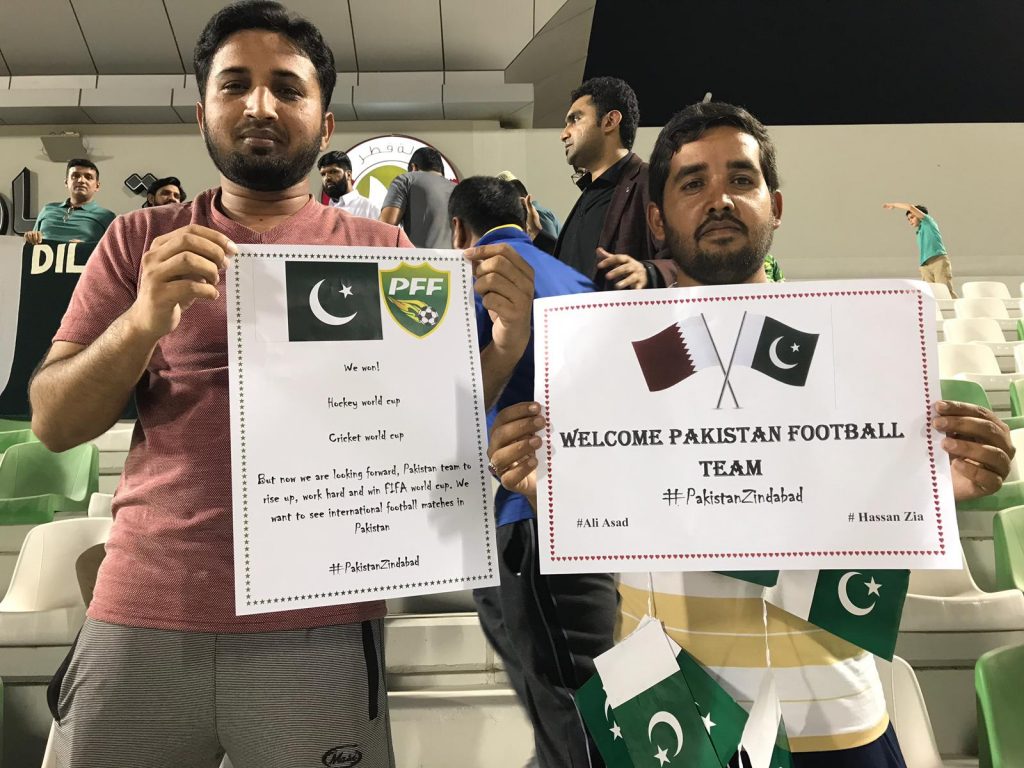
Anyway, a minute and a half after the restart, Adnan Mohammed working down the left-flank whips in a powerful cross. Bashir, constantly man-marked by two Cambodian defenders, manages to put a header on target… the ball is quick, so quick that the subs rush away from the bench, ready to run toward their teammate in anticipated celebration. This action only lasts a split-second, but it means an eternity: an eternity for a team who dreams of 2022 and another abandoned on the way not knowing what tomorrow can bring.
Keo Soksela, the young Cambodian goalkeeper, saves the day with his fingertips: the ball goes out for a corner. He immediately stands up, haranguing his defenders rushing to congratulate him. Nogueira does not move, he is steady, his face in his hands. There are 40 minutes left but the sky has begun to fall on Pakistani football. There is nothing he can do. By Bashir’s beard, this prophecy is really cursed!
In the 60th minute, Cambodia’s Sath Rosib, undoubtedly the best player on the pitch, goes through Muhammad Riaz, a winger playing as a makeshift yet vulnerable left back by Nogueira, and equalizes. “I had no choice, we had no real left back player,” pleaded Nogueira. In the final minutes of the game, Reung Bunheing scored to make Cambodia win 2-1 on the night with the help of Thierry Bin who earned a yellow card for his excessive celebration. “You need to get respected on the field sometimes,” a jubilant Bin joked after he greeted and bowed to the Pakistani players after the final whistle as a mark of respect. That perfectly summarized what may not have been a very beautiful match, but certainly embodies the beautiful game.
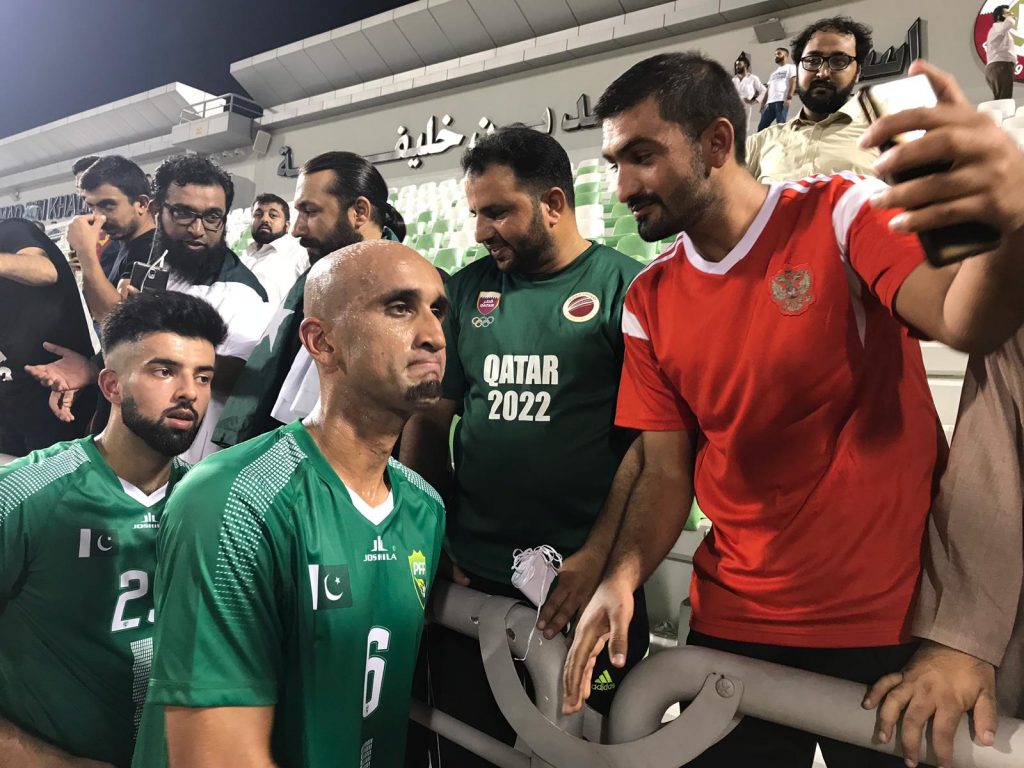
NOTES:
(1): Officially for “third party interference with the federation.” The suspension on PFF was lifted in March 2018, even if nothing has really changed, especially the corruption.
(2): Punjabi and Urdu are two of the languages spoken in Pakistan, including others like Pashto and Balochi.
(3): The Nabi siblings were born in England. All three brothers passed through the West Bromwich Albion academy. The eldest, Adil, played for English U16 and U17 sides. He currently plays in the Greek first division (OFI Crete), and has not yet accepted any Pakistani call-ups, unlike his two younger brothers, Samir and Rahis, who play in the lower English divisions – seventh.
(4): Trainee at Fulham FC, Rehman was born in England to a Pakistani family. He played for the English youth squads before responding to the Pakistani call as he went down the divisions.
(5): More than 6.2 million international tourists visited Cambodia in 2018 according to the Ministry of Tourism.


